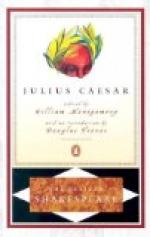|
This section contains 5,083 words (approx. 17 pages at 300 words per page) |

|
Dictionary of Literary Biography on Gaius Julius Caesar
No history, however bent on emphasizing collective decisions, can manage to get rid of the disturbing presence of individuals, they are simply there.
--Arnaldo Momigliano,
The Development of Greek Biography (1971)
Such was the pronouncement of one of the most important classical scholars of the twentieth century. Gaius Julius Caesar is perhaps history's greatest testimony to the truth of those words. Octavian, Caesar's eventual successor and adopted son, inherited his name and, as the emperor Augustus, ushered in the historical period of the Principate and the autocracy of the Roman emperors. In subsequent western history Caesar became a symbol for the power of both absolute monarchy and imperial conquest--a symbol that manifested itself in the designations of Russian Czar and German Kaiser. His influence has extended beyond the realms of history and politics. Many high-school students know the tale of Caesar's dramatic final days and assassination as William Shakespeare...
|
This section contains 5,083 words (approx. 17 pages at 300 words per page) |

|


